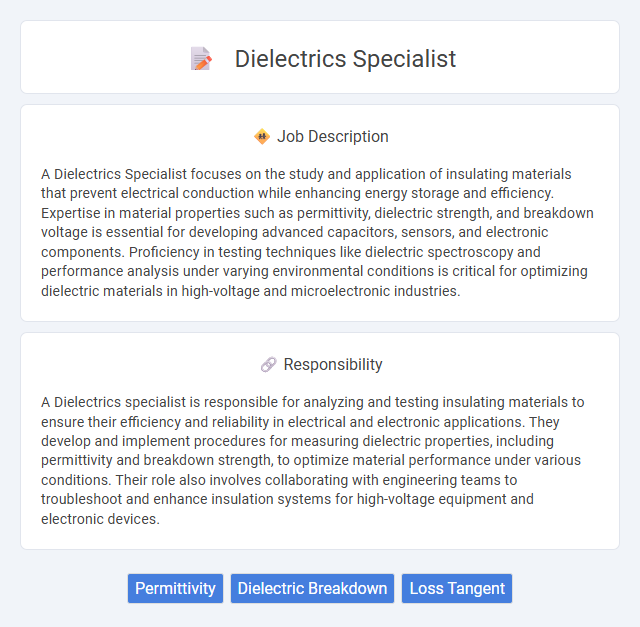
A Dielectrics Specialist focuses on the study and application of insulating materials that prevent electrical conduction while enhancing energy storage and efficiency. Expertise in material properties such as permittivity, dielectric strength, and breakdown voltage is essential for developing advanced capacitors, sensors, and electronic components. Proficiency in testing techniques like dielectric spectroscopy and performance analysis under varying environmental conditions is critical for optimizing dielectric materials in high-voltage and microelectronic industries.
Individuals who possess strong analytical skills and a keen interest in materials science are likely to be well-suited for a Dielectrics specialist role. Working conditions may involve exposure to laboratory environments and precise instrumentation, which might be challenging for those uncomfortable with technical settings. Candidates who thrive in detail-oriented tasks and problem-solving scenarios probably find this career rewarding and fitting.
Qualification
Dielectrics specialists require a strong background in materials science, electrical engineering, or physics, typically holding at least a bachelor's degree in these fields. Expertise in studying insulating materials, their electrical properties, and dielectric behavior under various conditions is essential. Proficiency in laboratory techniques, data analysis, and simulation software for evaluating dielectric constants and breakdown voltages enhances job performance.
Responsibility
A Dielectrics specialist is responsible for analyzing and testing insulating materials to ensure their efficiency and reliability in electrical and electronic applications. They develop and implement procedures for measuring dielectric properties, including permittivity and breakdown strength, to optimize material performance under various conditions. Their role also involves collaborating with engineering teams to troubleshoot and enhance insulation systems for high-voltage equipment and electronic devices.
Benefit
A dielectrics specialist likely experiences significant benefits including access to cutting-edge research opportunities and the ability to work with advanced materials that enhance electronic device performance. Employment in this field may offer competitive salaries and stable career growth due to increasing demand for improved insulation and energy storage solutions in technology industries. Professionals might also enjoy collaborative environments that foster innovation and skill development in material science and electrical engineering.
Challenge
A Dielectrics specialist likely faces significant challenges in understanding and managing the electrical insulating properties of materials under varying conditions. The role may involve complex problem-solving to enhance material performance and prevent failures in high-voltage environments. Staying updated with advancements in material science could be essential to overcome these technical and research obstacles effectively.
Career Advancement
A Dielectrics specialist focuses on the study and application of insulating materials in electrical and electronic devices, playing a critical role in improving device performance and reliability. Career advancement in this field typically involves gaining expertise in material science, high-voltage engineering, and dielectric testing techniques, leading to roles such as senior research engineer or technical consultant. Mastery of emerging technologies like nanodielectrics and participation in industrial standards development can accelerate progression to leadership positions within research and development departments.
Key Terms
Permittivity
Dielectrics specialists analyze and optimize the permittivity of materials to enhance their insulating properties in electronic components and systems. They conduct tests to measure dielectric constant and loss tangent, which are critical for determining the efficiency of capacitors and other insulating devices. Expertise in permittivity enables these specialists to develop advanced materials for applications in telecommunications, power systems, and microelectronics.
Dielectric Breakdown
A Dielectrics specialist focuses on understanding and preventing dielectric breakdown, a critical failure mode where insulating materials lose their insulating properties under high electric stress. They analyze material properties, test insulation strength, and develop innovative dielectric materials to enhance electrical device reliability. Expertise in dielectric breakdown mechanisms and mitigation techniques is essential for advancing high-voltage engineering applications and improving safety in power systems.
Loss Tangent
A dielectrics specialist focuses on analyzing and optimizing materials for minimal energy dissipation, with particular emphasis on loss tangent measurement to assess dielectric losses in insulators. Expertise in characterizing the loss tangent enables accurate determination of a material's efficiency and suitability for high-frequency or high-voltage applications. Proficiency in advanced techniques such as impedance spectroscopy and network analysis is crucial for improving dielectric performance and reducing signal degradation.
 kuljobs.com
kuljobs.com